|
|
28. Dec 2005
The world is too much with us
THE WORLD IS TOO MUCH WITH US
The world is too much with us: late and soon,
Getting and spending, we lay waste our powers:
Little we see in nature that is ours;
We have given our hearts away, a sordid boon!
The sea that bares her bosom to the moon:
The winds that will be howling all the hours,
And are up-gathered now like sleeping flowers;
For this, for every thing, we are out of tune;
It moves us not. - Great God! I'd rather be
A pagan suckled in a creed outworn;
So might I, standing on this pleasant lea,
Have glimpses that would make me less forlorn;
Have sight of Proteus rising from the sea;
Or hear old Triton blow his wreathed horn.
William Wordsworth (1770-1850)
[ agger, Wed 28 Dec, :11:54:
/digte] -
kommentar(er) -
link
20. Dec 2005
The Touchstone
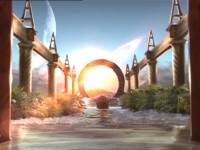
A man there came, whence none could tell,
Bearing a Touchstone in his hand;
And tested all things in the land
By its unerring spell.
Quick birth of transmutation smote
The fair to foul, the foul to fair;
Purple nor ermine did he spare,
Nor scorn the dusty coat.
Of heirloom jewels, prized so much,
Were many changed to chips and clods,
And even statues of the Gods
Crumbled beneath its touch.
Then angrily the people cried,
"The loss outweighs the profit far;
Our goods suffice us as they are
We will not have then tried."
And since they could not so prevail
To check this unrelenting guest,
They seized him, saying - "Let him test
How real it is, our jail!"
But, though they slew him with the sword,
And in a fire his Touchstone burn'd,
Its doings could not be o'erturned,
Its undoings restored.
And when to stop all future harm,
They strew'd its ashes on the breeze;
They little guess'd each grain of these
Convey'd the perfect charm.
North, south, in rings and amulets,
Throughout the crowded world 'tis borne;
Which, as a fashion long outworn,
In ancient mind forgets.
William Allingham (1824 - 1889)
[ agger, Tue 20 Dec, :13:55:
/digte] -
kommentar(er) -
link
16. Dec 2005
The tables turned
THE TABLES TURNED
UP! up! my Friend, and quit your books;
Or surely you'll grow double:
Up! up! my Friend, and clear your looks;
Why all this toil and trouble?
The sun, above the mountain's head,
A freshening lustre mellow
Through all the long green fields has spread,
His first sweet evening yellow.
Books! 'tis a dull and endless strife:
Come, hear the woodland linnet,
How sweet his music! on my life,
There's more of wisdom in it.
And hark! how blithe the throstle sings!
He, too, is no mean preacher:
Come forth into the light of things,
Let Nature be your teacher.
She has a world of ready wealth,
Our minds and hearts to bless--
Spontaneous wisdom breathed by health,
Truth breathed by cheerfulness.
One impulse from a vernal wood
May teach you more of man,
Of moral evil and of good,
Than all the sages can.
Sweet is the lore which Nature brings;
Our meddling intellect
Mis-shapes the beauteous forms of things:--
We murder to dissect.
Enough of Science and of Art;
Close up those barren leaves;
Come forth, and bring with you a heart
That watches and receives.
William Wordsworth (1770-1850)
[ agger, Fri 16 Dec, :21:37:
/digte] -
kommentar(er) -
link
14. Dec 2005
Apologia

APOLOGIA
IS it thy will that I should wax and wane,
Barter my cloth of gold for hodden grey,
And at thy pleasure weave that web of pain
Whose brightest threads are each a wasted day?
Is it thy will--Love that I love so well--
That my Soul's House should be a tortured spot
Wherein, like evil paramours, must dwell
The quenchless flame, the worm that dieth not?
Nay, if it be thy will I shall endure,
And sell ambition at the common mart,
And let dull failure be my vestiture,
And sorrow dig its grave within my heart.
Perchance it may be better so--at least
I have not made my heart a heart of stone,
Nor starved my boyhood of its goodly feast,
Nor walked where Beauty is a thing unknown.
Many a man hath done so; sought to fence
In straitened bonds the soul that should be free,
Trodden the dusty road of common sense,
While all the forest sang of liberty,
Not marking how the spotted hawk in flight
Passed on wide pinion through the lofty air,
To where the steep untrodden mountain height
Caught the last tresses of the Sun God's hair.
Or how the little flower he trod upon,
The daisy, that white-feathered shield of gold,
Followed with wistful eyes the wandering sun
Content if once its leaves were aureoled.
But surely it is something to have been
The best belovèd for a little while,
To have walked hand in hand with Love, and seen
His purple wings flit once across thy smile.
Ay! though the gorgèd asp of passion feed
On my boy's heart, yet have I burst the bars,
Stood face to face with Beauty, known indeed
The Love which moves the Sun and all the stars!
Oscar Wilde (1854-1900)
[ agger, Wed 14 Dec, :11:22:
/digte] -
kommentar(er) -
link
09. Dec 2005
Tvende dråber
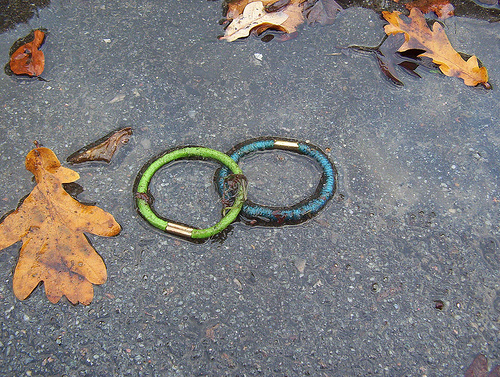
DE TVENDE DRAABER
Fra Maanenattens Sølversky
Til Jorden tvende Draaber tye,
Kun een i himmelsk Blanden;
Men faldende de skilles af,
Den ene sank paa Rosens Blad,
Ved Rosens Rod den anden.
I Stjerneskjær og Maanskin de
Saa kjærligt til hinanden see
Ved Elskovs Vexelklage:
"O glimt igjennem Nattens Slør!
Kun da, kun da jeg ikke døer,
Naar jeg dig seer, o Mage!"
Ved Klagen vaagner Vinden op
Og ryster Rosenbuskens Top,
Da løsner sig den ene,
Den falder til den anden ned,
Ved Jordens Barm, i savnløs Fred,
De atter sig forene.
A.W. Schack von Staffeldt (1769-1826)
[ agger, Fri 09 Dec, :19:45:
/digte] -
kommentar(er) -
link
08. Dec 2005
En frugtbar sten

EN FRUGTBAR STEN
Tung og kompakt som en drøm om at synke og synke,
svinde i mørket i barndommens bundløse mergelgrav.
Hård, uafvendelig, kold som en afklaret tanke,
der føder en glødende handling, sorgløs og sikker,
standser den først denne sten i det muldtunge skød,
som tar alting tilbage.
Trøsket træ, forbehold, rispapir, oprørte tvivl;
drømmens momentum er mægtigt, den bryder igennem.
Okker, oktoberløv, dæmring, kridt, kød, korn og mandler;
flintesprødt hviskende toner om troskab og kærlighed.
Nok var mit hjerte forstemt og min sjæl sammenbidt;
jeg var blind, men jeg fandt den.
Se, hvor den funkler og gløder af flintehård frugtbarhed;
skøn som en menneskesjæl, født på ny, våd og fedtet,
sitrende, levende, mættet med vilje og mening
som et dunkelt organ skåret ud af en dansende kæmpe.
Åreløb, pletter, hak, slag, sår, skift, kanter og skår;
kød, ganske vist! men forstenet.
Vær ikke bange, jeg søger jer ikke.
Falder jeg, pas I blot jeres.
Se, jeg vil hjem – hindr mig ikke;
jeg vil det som flint og som tid og som stål.
Flækker den, lægger den blot
hudbløde flader og glasklare ægge,
kanter, der skærer.
Helt ind til benet.
Jeppe Berg Sandvej - til hvem vi siger tak.
[ agger, Thu 08 Dec, :13:17:
/digte] -
kommentar(er) -
link
07. Dec 2005
Tilsløring
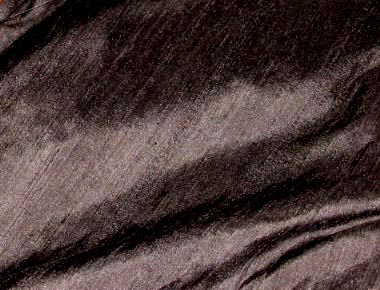
TILSLØRING
Jeg bærer mit slør, som jeg vil.
Langt og løst, så det slæber hen ad gulvet.
Sort fortil og sort bag,
Som et glimt af natten ved højlys dag.
Solen kan ikke,
Loven kan ikke,
Bryde slørets silke.
Kun én kan løfte,
Kun én kan se,
Hvilke skatte, der ligger bag.
Og hans hænder, og hans øjne
Har jeg forseglet
- med et kys.
Leyla Tamer
Nogle gange falder man over en perle så stor, at man må dele den med andre, og sådan er det med Leyla Tamers digt Tilsløring - en perle, som så meget andet i hendes forfatterskab.
[ agger, Wed 07 Dec, :08:26:
/digte] -
kommentar(er) -
link
28. Nov 2005
The Man to the Angel
THE MAN TO THE ANGEL
I have wept a million tears:
Pure and proud one, where are thine,
What the gain though all thy years
In unbroken beauty shine?
All your beauty cannot win
Truth we learn in pain and sighs:
You can never enter in
To the circle of the wise.
They are but the slaves of light
Who have never known the gloom,
And between the dark and bright
Willed in freedom their own doom.
Think not in your pureness there,
That our pain but follows sin:
There are fires for those who dare
Seek the throne of might to win.
Pure one, from your pride refrain:
Dark and lost amid the strife
I am myriad years of pain
Nearer to the font of life.
When defiance fierce is thrown
At the god to whom you bow,
Rest the lips of the Unknown
Tenderest upon my brow.
AE (George William Russell), 1867-1935
[ agger, Mon 28 Nov, :11:50:
/digte] -
kommentar(er) -
link
25. Nov 2005
What if I say I shall not wait?
What if I say I shall not wait?
What if I burst the fleshly gate
And pass, escaped, to thee?
What if I file this mortal off,
See where it hurt me,--that ’s enough,--
And wade in liberty?
They cannot take us any more,--
Dungeons may call, and guns implore;
Unmeaning now, to me,
As laughter was an hour ago,
Or laces, or a travelling show,
Or who died yesterday!
Emily Dickinson (1830-1886)
[ agger, Fri 25 Nov, :10:35:
/digte] -
kommentar(er) -
link
24. Nov 2005
Frihed
|
Se på mig!
-- Jeg er din frihed.
Jeg er døren ud af dit mørke.
Jeg er den handling,
som lå død i dig.
Ti stille!
Ikke mere ville!
Tag mig ind, læg mig
ved dit hjerte, og dan mig til
med de hænder, din længsel ejer.
|
Lad dine hundrede
bekymrede spørgsmål
halse af lykke og
løbe ad helvede til
med
savlet sprøjtende om ørerne!
|
Jeppe Berg Sandvej |
|
[ agger, Thu 24 Nov, :09:03:
/digte] -
kommentar(er) -
link
21. Nov 2005
I gave myself to him
I gave myself to him,
And took himself for pay.
The solemn contract of a life
Was ratified this way.
The wealth might disappoint,
Myself a poorer prove
Than this great purchaser suspect,
The daily own of Love
Depreciate the vision;
But, till the merchant buy,
Still fable, in the isles of spice,
The subtle cargoes lie.
At least, 't is mutual risk,--
Some found it mutual gain;
Sweet debt of Life,--each night to owe,
Insolvent, every noon.
Emily Dickinson (1830-1886)
[ agger, Mon 21 Nov, :09:29:
/digte] -
kommentar(er) -
link
14. Nov 2005
Til en veninde
TIL EN VENINDE
Der er en Trolddom paa din Læbe,
Der er en Afgrund i dit Blik,
Der er i Lyden af din Stemme
En Drøms ætheriske Musik.
Der er en Klarhed paa din Pande,
Der er et Mørke i dit Haar,
Der er en Strøm af Blomsteraande
Omkring dig, hvor du staaer og gaaer.
Der er en Skat af evig Viisdom
I Smilehullet paa din Kind,
Der er en Brønd, en Sundhedskilde
For alle Hjerter, i dit Sind.
Der er en Verden i dit Indre,
En sværmerisk, chaotisk Vaar --
Som jeg umulig kan forglemme,
Som jeg tilbeder og forstaaer.
Emil Aarestrup (1800-1856)
[ agger, Mon 14 Nov, :15:47:
/digte] -
kommentar(er) -
link
04. Nov 2005
At være

AT VÆRE
At stoppe øret til med kvalme
At jage angsten med en salme
At fylde maven op med sten
At være én
At savne æde, at æde savnet
At lade leden glemme navnet
At vingeklippe længslens fugl
At være gul
At ville vove - at vove ville
At byde tvivl og vantro: Stille!
At samle sjælen til et smil
At være pil
Jeppe Berg Sandvej
Jeppe Sandvej udgiver til
foråret
digtsamlingen Vejrbidt. I mellemtiden er der meget
at hente på hans hjemmeside -
en lang række digte,
der hæver sig over meget af tidens lyrik, og en række artikler og øvrige tekster.
[ agger, Fri 04 Nov, :22:06:
/digte] -
kommentar(er) -
link
Santa Decca
SANTA DECCA
The Gods are dead : no longer do we bring
To grey-eyed Pallas crowns of olive-leaves!
Demeter's child no more hath tithe of sheaves,
And in the noon the careless shepherds sing,
For Pan is dead, and all the wantoning
By secret glade and devious haunt is o'er:
Young Hylas seeks the water-springs no more;
Great Pan is dead, and Mary's son is King.
And yet - perchance in this sea-trancèd isle,
Chewing the bitter fruit of memory,
Some God lies hidden in the asphodel
Ah Love! if such there be, then it were well
For us to fly his anger: nay, but see,
The leaves are stirring: let us watch awhile.
Oscar Wilde (1854-1900)
[ agger, Fri 04 Nov, :15:39:
/digte] -
kommentar(er) -
link
30. Oct 2005
To a common prostitute
Be composed — be at ease with me — I am Walt Whitman, liberal and
lusty as Nature;
Not till the sun excludes you, do I exclude you;
Not till the waters refuse to glisten for you, and the leaves to
rustle for you, do my words refuse to glisten and rustle for you.
My girl, I appoint with you an appointment—and I charge you that you
make preparation to be worthy to meet me,
And I charge you that you be patient and perfect till I come.
Till then, I salute you with a significant look, that you do not
forget me.
Walt Whitman (1819-1892)
[ agger, Sun 30 Oct, :23:07:
/digte] -
kommentar(er) -
link
21. Oct 2005
Bride of Abydos
Know ye the land where cypress and myrtle
Are emblems of deeds that are done in their clime,
Where the rage of the vulture, the love of the turtle,
Now melt into sorrow, now madden to crime?
Know ye the land of the cedar and vine,
Where the flowers ever blossom, the beams ever shine;
Where the light wings of Zephyr, oppress'd with perfume,
Wax faint o'er the gardens of Gúl in her bloom;
Where the citron and olive are fairest of fruit,
And the voice of the nightingale never is mute;
Where the tints of the earth, and the hues of the sky,
In colour though varied, in beauty may vie,
And the purple of Ocean is deepest in dye;
Where the virgins are soft as the roses they twine,
And all, save the spirit of man, is divine?
'Tis the clime of the East; 'tis the land of the Sun —
Can he smile on such deeds as his children have done?
Oh! wild as the accents of lovers' farewell
Are the hearts which they bear, and the tales which they tell.
Lord Byron (1788-1824)
(Uddrag, begyndelsen af Bride of Abydos).
[ agger, Fri 21 Oct, :23:04:
/digte] -
kommentar(er) -
link
20. Oct 2005
Til Wordsworth
TO WORDSWORTH
Poet of Nature, thou hast wept to know
That things depart which never may return:
Childhood and youth, friendship, and love's first glow,
Have fled like sweet dreams, leaving thee to mourn.
These common woes I feel. One loss is mine
Which thou too feel'st, yet I alone deplore.
Thou wert as a lone star whose light did shine
On some frail bark in winter's midnight roar:
Thou hast like to a rock-built refuge stood
Above the blind and battling multitude:
In honoured poverty thy voice did weave
Songs consecrate to truth and liberty.
Deserting these, thou leavest me to grieve,
Thus having been, that thou shouldst cease to be.
Percy Bysshe Shelley (1792–1822)
William Wordsworth skrev i sine yngre dage mange sublime digte, bl.a.
sammen med Coleridge i Lyrical Ballads (1798) - mange af de
kortere vil jeg gerne på et tidspunkt bringe her på siden.
Wordsworth blev senere i sit liv mere og mere konservativ, og hans
digtning mindre og mindre inspireret.
Dette digt er altså Shelleys hyldest til den digter, Wordsworth havde
været,
hans sorg over den endnu levende digters død.
[ agger, Thu 20 Oct, :13:24:
/digte] -
kommentar(er) -
link
17. Oct 2005
My pretty rose tree
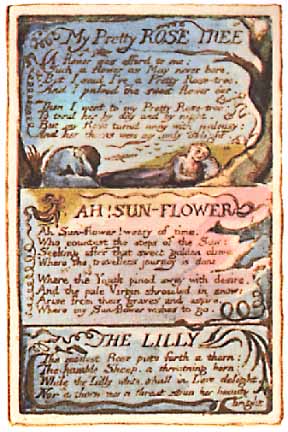
MY PRETTY ROSE TREE
A flower was offered to me,
Such a flower as May never bore;
But I said, "I've a pretty rose-tree",
And I passed the sweet flower o'er.
Then I went to my pretty rose-tree,
To tend her by day and by night;
But my rose turned away with jealousy,
And her thorns were my only delight.
William Blake (1767-1827)
[ agger, Mon 17 Oct, :14:34:
/digte] -
kommentar(er) -
link
11. Oct 2005
To a foiled European revolutionary
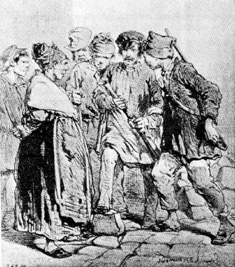
TO A FOIL'D EUROPEAN REVOLUTIONAIRE
Courage yet, my brother or my sister!
Keep on - Liberty is to be subserv'd whatever occurs;
That is nothing that is quell'd by one or two failures, or any number
of failures,
Or by the indifference or ingratitude of the people, or by any
unfaithfulness,
Or the show of the tushes of power, soldiers, cannon, penal statutes.
What we believe in waits latent forever through all the continents,
Invites no one, promises nothing, sits in calmness and light, is
positive and composed,
knows no discouragement,
Waiting patiently, waiting its time.
(Not songs of loyalty alone are these,
But songs of insurrection also,
For I am the sworn poet of every dauntless rebel the world over,
And he going with me leaves peace and routine behind him,
And stakes his life to be lost at any moment.)
The battle rages with many a loud alarm and frequent advance and
retreat,
The infidel triumphs, or supposes he triumphs,
The prison, scaffold, garroté, handcuffs, iron necklace and lead-balls
do their work,
The named and unnamed heroes pass to other spheres,
The great speakers and writers are exiled, they lie sick in distant
lands,
The cause is asleep, the strongest throats are choked with their own
blood,
The young men droop their eyelashes toward the ground when they meet;
But for all this Liberty has not gone out of the place, nor the
infidel enter'd into full possession.
When liberty goes out of the place it is not the first to go, nor the
second or third to go,
It waits for all the rest to go, it is the last.
Where there are no more memories of heroes and martyrs,
And when all life and all the souls of men and women are discharged
from any part of the earth.
Then only shall liberty or the idea of liberty be discharged from that
part of the earth,
And the infidel come into full possession.
Then courage European revolter, revoltress!
For till all ceases neither must you cease.
I do not know what you are here for, (I do not know what I am for
myself, nor what any thing is for,)
But I will search carefully for it even in being foil'd,
In defeat, poverty, misconception, imprisonment - for they too are
great.
Did we think victory great?
So it is - but now it seems to me, when it cannot be help'd, that
defeat is great,
And that death and dismay are great.
Walt Whitman (1819-1892)
[ agger, Tue 11 Oct, :15:04:
/digte] -
kommentar(er) -
link
09. Oct 2005
Til eftertanke
LEV I DAG
Lev i dag så du kan dø i morgen.
Lad dit hjerte slå for mer end én.
Den som skænker livet sine drømme
skal forlade jorden rig og ren.
Lev dit ene liv som var du viet
til at sone alt hvad vi forbrød.
Gør dig ren, at du en dag kan smile
gennem sorgen i din egen død.
Mød din død som var den livets blomstring.
Høsten blusser varmt på vårens bund.
Lev i dag så du kan dø i morgen
lykkelig for hver en levet stund.
Halfdan Rasmussen (1915-2002)
[ agger, Sun 09 Oct, :09:46:
/digte] -
kommentar(er) -
link
04. Oct 2005
A song
The world for a whore!
The sky for a harlot!
All life at your door
For a woman of scarlet!
A bitter exchange?
A bad bargain to strike? it
May seem to you strange
The fact is -- I like it!
You offer me gold
Place, power and pleasure
To have and to hold --
Inexhaustible treasure!
I'll give it and more
In this planet of boredom
For a girl that's a whore
And is proud of her whoredom!
Aleister Crowley (1875-1947)
[ agger, Tue 04 Oct, :13:13:
/digte] -
kommentar(er) -
link
01. Oct 2005
Det onde
RENE HÆNDER
Jeg lod det onde ske
og græd for dem som døde.
jeg så min bror forbløde
og turde intet se.
Min sorg var lys og sval.
Min gråd blev let at bære.
Jeg lærte at begære
min egen milde kval.
Det onde gik mig nær.
Jeg ville kun det bedste.
Jeg overlod min næste
at løfte stridens sværd.
Min hånd var ren og svag,
af sorg og rædsel lammet,
hvor din var rå og skrammet
af sejr og nederlag.
Jeg gik den lette vej.
De led. Og jeg var med dem.
De græd. Og jeg begræd dem ...
Det onde det er mig!
Halfdan Rasmussen (1915-2002)
[ agger, Sat 01 Oct, :15:02:
/digte] -
kommentar(er) -
link
30. Sep 2005
Paradox
WRITING
A man who keeps a diary, pays
Due toll to many tedious days;
But life becomes eventful--then
His busy hand forgets the pen.
Most books, indeed, are records less
Of fulness than of emptiness.
William Allingham (1824 - 1889)
[ agger, Fri 30 Sep, :20:59:
/digte] -
kommentar(er) -
link
25. Sep 2005
Nu er krigen blæst ind
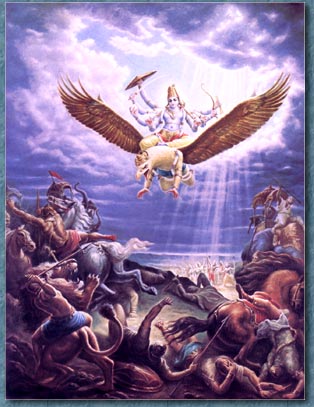
NU ER KRIGEN BLÆST IND
Nu er krigen blæst ind.
Det mørkner.
Frygten holder modet i hånden.
Jeg står i tårer til knæene og smiler.
Hvordan skal dog vi få …?
Hvordan kan vi vel ikke!
Nu er krigen blæst ind.
Vi ventede.
Snart venter vi ikke længere.
Kragerne snakker og gynger på grenene.
Månen er hvid som sne.
Ingen ser sig tilbage.
Nu er krigen blæst ind.
Det tårner sig op.
Ulmer og skummer og bryster sig.
Men hvad er et uvejr mod menneskets hænder?
Hvad kan et menneske?
Se, hvad et menneske kan!
Nu er krigen blæst ind.
Nu er krigen blæst ind.
Hvert ord et hug, hver tanke et stød.
Hvert kærtegn en flammende sten mod dets panser.
Hver drøm et giftigt pust
af ånd i dødens ansigt.
Nu er krigen blæst ind.
Det er slut med at vente.
Nu ser vi det rugende mørke.
Dyret har lejret sig tungt over landet.
Men vi er i grøften
under dets glidende bug.
Jeppe Berg Sandvej
[ agger, Sun 25 Sep, :09:56:
/digte] -
kommentar(er) -
link
21. Sep 2005
A poison tree
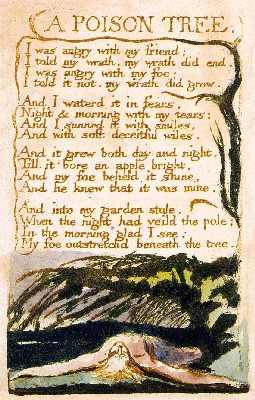
A POISON TREE
I was angry with my friend:
I told my wrath, my wrath did end.
I was angry with my foe:
I told it not, my wrath did grow.
And I water'd it in fears,
Night and morning with my tears;
And I sunned it with smiles,
And with soft deceitful wiles.
And it grew both day and night,
Till it bore an apple bright;
And my foe beheld it shine,
And he knew that it was mine,
And into my garden stole
When the night had veil'd the pole:
In the morning glad I see
My foe outstretch'd beneath the tree.
William Blake (1757-1827)
[ agger, Wed 21 Sep, :10:52:
/digte] -
kommentar(er) -
link
20. Sep 2005
In a myrtle shade
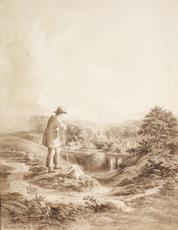
IN A MYRTLE SHADE
To a lovely myrtle bound,
Blossoms show'ring all around,
O how sick and weary I
Underneath my myrtle lie!
Why should I be bound to thee,
O my lovely myrtle-tree?
Love, free Love, cannot be bound
To any tree that grows on ground.
William Blake (1757-1827)
[ agger, Tue 20 Sep, :21:06:
/digte] -
kommentar(er) -
link
19. Sep 2005
Fairies
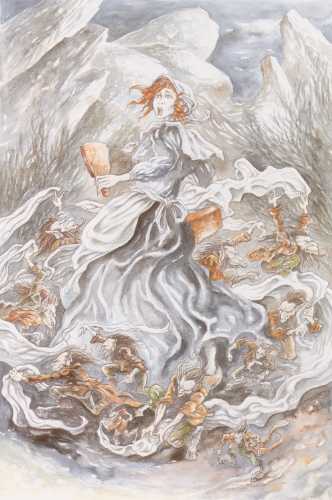
THE FAIRIES
UP the airy mountain,
Down the rushy glen,
We daren’t go a-hunting
For fear of little men;
Wee folk, good folk,
Trooping all together;
Green jacket, red cap,
And white owl’s feather!
Down along the rocky shore
Some make their home,
They live on crispy pancakes
Of yellow tide-foam;
Some in the reeds
Of the black mountain lake,
With frogs for their watch-dogs,
All night awake.
High on the hill-top
The old King sits;
He is now so old and gray
He’s nigh lost his wits.
With a bridge of white mist
Columbkill he crosses,
On his stately journeys
From Slieveleague to Rosses;
Or going up with music
On cold starry nights
To sup with the Queen
Of the gay Northern Lights.
They stole little Bridget
For seven years long;
When she came down again
Her friends were all gone.
They took her lightly back,
Between the night and morrow,
They thought that she was fast asleep,
But she was dead with sorrow.
They have kept her ever since
Deep within the lake,
On a bed of flag-leaves,
Watching till she wake.
By the craggy hill-side,
Through the mosses bare,
They have planted thorn-trees
For pleasure here and there.
If any man so daring
As dig them up in spite,
He shall find their sharpest thorns
In his bed at night.
Up the airy mountain,
Down the rushy glen,
We daren’t go a-hunting
For fear of little men;
Wee folk, good folk,
Trooping all together;
Green jacket, red cap,
And white owl’s feather!
William Allingham (1824-1889)
[ agger, Mon 19 Sep, :10:01:
/digte] -
kommentar(er) -
link
17. Sep 2005
Galatea
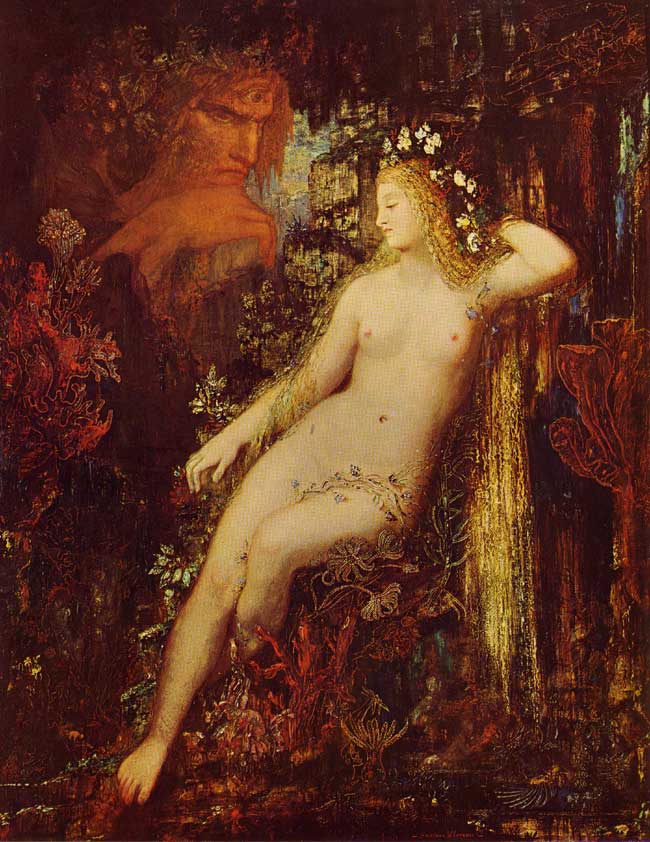
O Galatea, med huden så hvid som de hvideste snebær,
yppig som engen om våren, så slank som den slankeste poppel,
skær som det klareste glas og kåd som det kådeste spædkid,
glat som den glatteste skal, som sandet på stranden har slebet,
kær som solen en vinterlig dag og som skygge om somren,
ædel som ædelrisfrugt, og så flot som det høje platantræ,
lysende ligesom is og så sød som den modneste drue,
lige så blød som et dun af en edderfugl eller som tykmælk,
og, når du ikke forsvinder, så smuk som en nyvandet have!
Fra Ovid: Metamorfoser, 13. sang - oversat af Otto Steen Due.
Maleri af Gustave Moreau (1826-1898).
[ agger, Sat 17 Sep, :22:02:
/digte] -
kommentar(er) -
link
16. Sep 2005
The Will and the Way
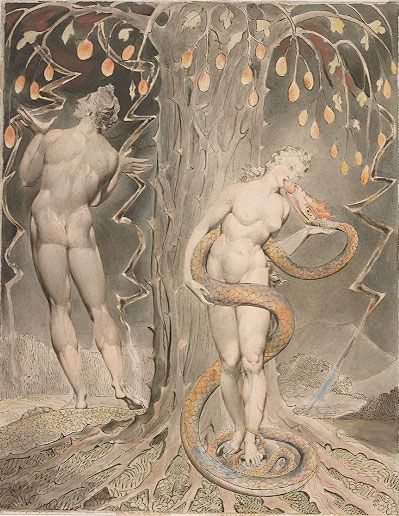
THE WILL AND THE WAY
I asked a thief to steal me a peach:
He turned up his eyes.
I asked a lithe lady to lay her down:
"Holy and Meek!" she cries.
As soon as I went,
An Angel came.
He winked at the thief
And smiled at the dame:
And, without one word spoke
Had a peach from the tree,
And 'twixt earnest and joke
Enjoyed the lady.
William Blake (1757-1827)
[ agger, Fri 16 Sep, :08:31:
/digte] -
kommentar(er) -
link
15. Sep 2005
Thames and Ohio
THAMES AND OHIO
Why should I care for the men of Thames
Or the cheating waves of charter'd streams
Or shrink at the little blasts of fear
That the hireling blows into my ear?
Though born on the cheating banks of Thames
Though his waters bathed my infant limbs
The Ohio shall wash his stains from me
I was born a slave but I go to be free.
William Blake (1757-1827)
[ agger, Thu 15 Sep, :08:27:
/digte] -
kommentar(er) -
link
14. Sep 2005
Carpe Vitam
OPPORTUNITY
He who bends to himself a Joy
Does the winged life destroy;
But he who kisses the Joy as it flies
Lives in Eternity's sunrise.
If you trap the moment before it's ripe,
The tears of repentance you'll certainly wipe;
But if once you let the ripe moment go,
You can never wipe off the tears of woe.
William Blake (1757-1827)
[ agger, Wed 14 Sep, :08:34:
/digte] -
kommentar(er) -
link
13. Sep 2005
Mercy, Pity, Peace
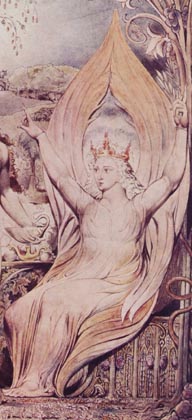
THE TWO SONGS
I heard an Angel singing
When the day was springing,
"Mercy, Pity, and Peace
Is the world's release."
Thus he sung all day
Over the new-mown hay,
Till the sun went down
And haycocks lookèd brown.
I heard a Devil curse
Over the heath and the furze:
"Mercy could be no more,
If there was nobody poor,
And pity no more could be,
If all were as happy as ye:
And mutual fear brings peace.
Miseries' increase
Are mercy, pity, peace."
At his curse the sun went down,
And the heavens gave a frown.
William Blake (1857-1727)
[ agger, Tue 13 Sep, :09:19:
/digte] -
kommentar(er) -
link
10. Sep 2005
The Clod and the Pebble
THE CLOD AND THE PEBBLE
"Love seeketh not itself to please,
Nor for itself hath any care,
But for another gives its ease,
And builds a heaven in hell's despair."
So sang a little clod of clay,
Trodden with the cattle's feet,
But a pebble of the brook
Warbled out these metres meet:
"Love seeketh only Self to please,
To bind another to its delight,
Joys in anothers loss of ease,
And builds a hell in heaven's despite."
William Blake (1757-1827)
[ agger, Sat 10 Sep, :18:52:
/digte] -
kommentar(er) -
link
09. Sep 2005
Rose

THE SICK ROSE
O Rose, thou art sick!
The invisible worm,
That flies in the night,
In the howling storm,
Has found out thy bed
Of crimson joy;
And his dark secret love
Does thy life destroy.
William Blake (1757-1827)
[ agger, Fri 09 Sep, :10:06:
/digte] -
kommentar(er) -
link
07. Sep 2005
As I lay with my head in your lap
AS I LAY WITH MY HEAD IN YOUR LAP CAMERADO
AS I lay with my head in your lap, Camerado,
The confession I made I resume — what I said to you in the open air I
resume:
I know I am restless, and make others so;
I know my words are weapons, full of danger, full of death;
(Indeed I am myself the real soldier;
It is not he, there, with his bayonet, and not the red-striped
artilleryman;)
For I confront peace, security, and all the settled laws, to unsettle
them;
I am more resolute because all have denied me, than I could ever have
been had all accepted me;
I heed not, and have never heeded, either experience, cautions,
majorities, nor ridicule;
And the threat of what is call’d hell is little or nothing to me;
And the lure of what is call’d heaven is little or nothing to me;
Dear camerado! I confess I have urged you onward with me, and still
urge you, without the least idea what is our destination,
Or whether we shall be victorious, or utterly quell’d and defeated.
Walt Whitman (1819-1892)
[ agger, Wed 07 Sep, :09:05:
/digte] -
kommentar(er) -
link
06. Sep 2005
Tyger
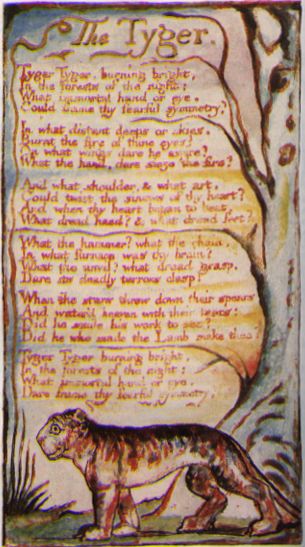
Tiger, tiger, burning bright
In the forests of the night,
What immortal hand or eye
Could frame thy fearful symmetry?
In what distant deeps or skies
Burnt the fire of thine eyes?
On what wings dare he aspire?
What the hand dare seize the fire?
And what shoulder and what art
Could twist the sinews of thy heart?
And, when thy heart began to beat,
What dread hand and what dread feet?
What the hammer? what the chain?
In what furnace was thy brain?
What the anvil? what dread grasp
Dare its deadly terrors clasp?
When the stars threw down their spears,
And watered heaven with their tears,
Did He smile His work to see?
Did He who made the lamb make thee?
Tiger, tiger, burning bright
In the forests of the night,
What immortal hand or eye
Dare frame thy fearful symmetry?
William Blake (1757–1827)
[ agger, Tue 06 Sep, :10:15:
/digte] -
kommentar(er) -
link
05. Sep 2005
Garden of Love
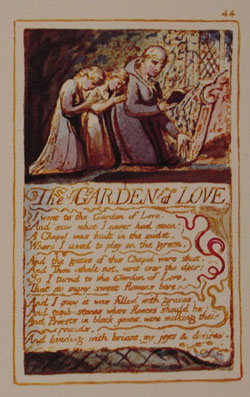
THE GARDEN OF LOVE
I went to the Garden of Love,
And saw what I never had seen:
A Chapel was built in the midst,
Where I used to play on the green.
And the gates of this Chapel were shut,
And "Thou shalt not" writ over the door;
So I turn'd to the Garden of Love,
That so many sweet flowers bore,
And I saw it was filled with graves,
And tomb-stones where flowers should be:
And Priests in black gowns were walking their rounds,
And binding with briars my joys & desires.
William Blake (1757-1827)
[ agger, Mon 05 Sep, :07:14:
/digte] -
kommentar(er) -
link
31. Aug 2005
Golden Apples of the Sun
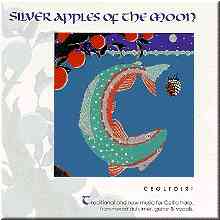
THE SONG OF WANDERING AENGUS
I went out to the hazel wood,
Because a fire was in my head,
And cut and peeled a hazel wand,
And hooked a berry to a thread;
And when white moths were on the wing,
And moth-like stars were flickering out,
I dropped the berry in a stream
And caught a little silver trout.
When I had laid it on the floor
I went to blow the fire aflame,
But something rustled on the floor,
And some one called me by my name:
It had become a glimmering girl
With apple blossom in her hair
Who called me by my name and ran
And faded through the brightening air.
Though I am old with wandering
Through hollow lands and hilly lands,
I will find out where she has gone,
And kiss her lips and take her hands;
And walk among long dappled grass,
And pluck till time and times are done
The silver apples of the moon,
The golden apples of the sun.
W. B. Yeats (1865-1939)
[ agger, Wed 31 Aug, :17:47:
/digte] -
kommentar(er) -
link
30. Aug 2005
La Belle Dame Sans Merci
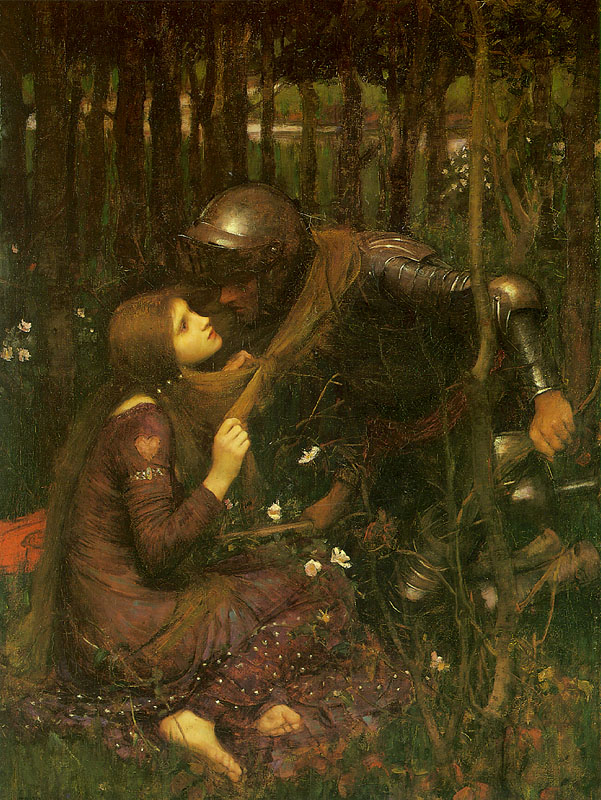
LA BELLE DAME SANS MERCI
I.
O WHAT can ail thee, knight-at-arms,
Alone and palely loitering?
The sedge has wither’d from the lake,
And no birds sing.
II.
O what can ail thee, knight-at-arms!
So haggard and so woe-begone?
The squirrel’s granary is full,
And the harvest’s done.
III.
I see a lily on thy brow
With anguish moist and fever dew,
And on thy cheeks a fading rose
Fast withereth too.
IV.
I met a lady in the meads,
Full beautiful—a faery’s child,
Her hair was long, her foot was light,
And her eyes were wild.
V.
I made a garland for her head,
And bracelets too, and fragrant zone;
She look’d at me as she did love,
And made sweet moan.
VI.
I set her on my pacing steed,
And nothing else saw all day long,
For sidelong would she bend, and sing
A faery’s song.
VII.
She found me roots of relish sweet,
And honey wild, and manna dew,
And sure in language strange she said—
“I love thee true.”
VIII.
She took me to her elfin grot,
And there she wept, and sigh’d fill sore,
And there I shut her wild wild eyes
With kisses four.
IX.
And there she lulled me asleep,
And there I dream’d—Ah! woe betide!
The latest dream I ever dream’d
On the cold hill’s side.
X.
I saw pale kings and princes too,
Pale warriors, death-pale were they all;
They cried—“La Belle Dame sans Merci
Hath thee in thrall!”
XI.
I saw their starved lips in the gloam,
With horrid warning gaped wide,
And I awoke and found me here,
On the cold hill’s side.
XII.
And this is why I sojourn here,
Alone and palely loitering,
Though the sedge is wither’d from the lake,
And no birds sing.
John Keats (1795-1821)
- maleri af John William Waterhouse (1849-1917).
[ agger, Tue 30 Aug, :10:25:
/digte] -
kommentar(er) -
link
19. Aug 2005
Realm of Fancy
FANCY
Ever let the Fancy roam,
Pleasure never is at home:
At a touch sweet Pleasure melteth,
Like to bubbles when rain pelteth;
Then let winged Fancy wander
Through the thought still spread beyond her:
Open wide the mind’s cage-door,
She’ll dart forth, and cloudward soar.
O sweet Fancy! let her loose;
Summer’s joys are spoilt by use,
And the enjoying of the Spring
Fades as does its blossoming;
Autumn’s red-lipp’d fruitage too,
Blushing through the mist and dew,
Cloys with tasting: What do then?
Sit thee by the ingle, when
The sear faggot blazes bright,
Spirit of a winter’s night;
When the soundless earth is muffled,
And the caked snow is shuffled
From the ploughboy’s heavy shoon;
When the Night doth meet the Noon
In a dark conspiracy
To banish Even from her sky.
Sit thee there, and send abroad,
With a mind self-overaw’d,
Fancy, high-commission’d:—send her!
She has vassals to attend her:
She will bring, in spite of frost,
Beauties that the earth hath lost;
She will bring thee, all together,
All delights of summer weather;
All the buds and bells of May,
From dewy sward or thorny spray;
All the heaped Autumn’s wealth,
With a still, mysterious stealth:
She will mix these pleasures up
Like three fit wines in a cup,
And thou shalt quaff it:—thou shalt hear
Distant harvest-carols clear;
Rustle of the reaped corn;
Sweet birds antheming the morn:
And, in the same moment—hark!
’Tis the early April lark,
Or the rooks, with busy caw,
Foraging for sticks and straw.
Thou shalt, at one glance, behold
The daisy and the marigold;
White-plum’d lilies, and the first
Hedge-grown primrose that hath burst;
Shaded hyacinth, alway
Sapphire queen of the mid-May;
And every leaf, and every flower
Pearled with the self-same shower.
Thou shalt see the field-mouse peep
Meagre from its celled sleep;
And the snake all winter-thin
Cast on sunny bank its skin;
Freckled nest-eggs thou shalt see
Hatching in the hawthorn-tree,
When the hen-bird’s wing doth rest
Quiet on her mossy nest;
Then the hurry and alarm
When the bee-hive casts its swarm;
Acorns ripe down-pattering,
While the autumn breezes sing.
Oh, sweet Fancy! let her loose;
Every thing is spoilt by use:
Where’s the cheek that doth not fade,
Too much gaz’d at? Where’s the maid
Whose lip mature is ever new?
Where’s the eye, however blue,
Doth not weary? Where’s the face
One would meet in every place?
Where’s the voice, however soft,
One would hear so very oft?
At a touch sweet Pleasure melteth
Like to bubbles when rain pelteth.
Let, then, winged Fancy find
Thee a mistress to thy mind:
Dulcet-eyed as Ceres’ daughter,
Ere the God of Torment taught her
How to frown and how to chide;
With a waist and with a side
White as Hebe’s, when her zone
Slipt its golden clasp, and down
Fell her kirtle to her feet,
While she held the goblet sweet,
And Jove grew languid.—Break the mesh
Of the Fancy’s silken leash;
Quickly break her prison-string
And such joys as these she’ll bring.—
Let the winged Fancy roam,
Pleasure never is at home.
John Keats (1795-1821)
John Keats var en
af den engelske romantiks allerstørste digtere, et helt usædvanligt
digterisk og sprogligt geni, som desværre døde af tuberkulose kort
efter, at han for alvor syntes at have fundet sin form og sit format.
Mange af hans digte er forholdsvis vanskelige, men en perle som denne
har den dobbelte fordel at være både smuk og forholdsvis let
tilgængelig.
[ agger, Fri 19 Aug, :14:45:
/digte] -
kommentar(er) -
link
16. Aug 2005
Bards of Passion and of Mirth
ODE
Bards of Passion and of Mirth,
Ye have left your souls on earth!
Have ye souls in heaven too,
Double-lived in regions new?
Yes, and those of heaven commune
With the spheres of sun and moon;
With the noise of fountains wond’rous,
And the parle of voices thund’rous;
With the whisper of heaven’s trees
And one another, in soft ease
Seated on Elysian lawns
Brows’d by none but Dian’s fawns;
Underneath large blue-bells tented,
Where the daisies are rose-scented,
And the rose herself has got
Perfume which on earth is not;
Where the nightingale doth sing
Not a senseless, tranced thing,
But divine melodious truth;
Philosophic numbers smooth;
Tales and golden histories
Of heaven and its mysteries.
Thus ye live on high, and then
On the earth ye live again;
And the souls ye left behind you
Teach us, here, the way to find you,
Where your other souls are joying,
Never slumber’d, never cloying.
Here, your earth-born souls still speak
To mortals, of their little week;
Of their sorrows and delights;
Of their passions and their spites;
Of their glory and their shame;
What doth strengthen and what maim.
Thus ye teach us, every day,
Wisdom, though fled far away.
Bards of Passion and of Mirth,
Ye have left your souls on earth!
Ye have souls in heaven too,
Double-lived in regions new!
John Keats (1795-1821)
[ agger, Tue 16 Aug, :12:02:
/digte] -
kommentar(er) -
link
10. Aug 2005
Generationer
YOUNG LOVE
Are not the joys of morning sweeter
Than the joys of night?
And are the vigorous joys of youth
Ashamèd of the light?
Let age and sickness silent rob
The vineyard in the night
But those who burn with vigorous youth
Pluck fruits before the light!
William Blake (1757-1827)
[ agger, Wed 10 Aug, :20:40:
/digte] -
kommentar(er) -
link
17. Jul 2005
The Ballad of Reading Gaol
THE BALLAD OF READING GAOL
- a poem by Oscar Wilde (1854-1900)
He did not wear his scarlet coat,
For blood and wine are red,
And blood and wine were on his hands
When they found him with the dead,
The poor dead woman whom he loved,
And murdered in her bed.
He walked amongst the Trial Men
In a suit of shabby grey;
A cricket cap was on his head,
And his step seemed light and gay;
But I never saw a man who looked
So wistfully at the day.
I never saw a man who looked
With such a wistful eye
Upon that little tent of blue
Which prisoners call the sky,
And at every drifting cloud that went
With sails of silver by.
I walked, with other souls in pain,
Within another ring,
And was wondering if the man had done
A great or little thing,
When a voice behind me whispered low,
"That fellow's got to swing."
Dear Christ! the very prison walls
Suddenly seemed to reel,
And the sky above my head became
Like a casque of scorching steel;
And, though I was a soul in pain,
My pain I could not feel.
I only knew what hunted thought
Quickened his step, and why
He looked upon the garish day
With such a wistful eye;
The man had killed the thing he loved
And so he had to die.
Yet each man kills the thing he loves
By each let this be heard,
Some do it with a bitter look,
Some with a flattering word,
The coward does it with a kiss,
The brave man with a sword!
Some kill their love when they are young,
And some when they are old;
Some strangle with the hands of Lust,
Some with the hands of Gold:
The kindest use a knife, because
The dead so soon grow cold.
Some love too little, some too long,
Some sell, and others buy;
Some do the deed with many tears,
And some without a sigh:
For each man kills the thing he loves,
Yet each man does not die.
He does not die a death of shame
On a day of dark disgrace,
Nor have a noose about his neck,
Nor a cloth upon his face,
Nor drop feet foremost through the floor
Into an empty place
He does not sit with silent men
Who watch him night and day;
Who watch him when he tries to weep,
And when he tries to pray;
Who watch him lest himself should rob
The prison of its prey.
He does not wake at dawn to see
Dread figures throng his room,
The shivering Chaplain robed in white,
The Sheriff stern with gloom,
And the Governor all in shiny black,
With the yellow face of Doom.
He does not rise in piteous haste
To put on convict-clothes,
While some coarse-mouthed Doctor gloats, and notes
Each new and nerve-twitched pose,
Fingering a watch whose little ticks
Are like horrible hammer-blows.
He does not know that sickening thirst
That sands one's throat, before
The hangman with his gardener's gloves
Slips through the padded door,
And binds one with three leathern thongs,
That the throat may thirst no more.
He does not bend his head to hear
The Burial Office read,
Nor, while the terror of his soul
Tells him he is not dead,
Cross his own coffin, as he moves
Into the hideous shed.
He does not stare upon the air
Through a little roof of glass;
He does not pray with lips of clay
For his agony to pass;
Nor feel upon his shuddering cheek
The kiss of Caiaphas.
II
Six weeks our guardsman walked the yard,
In a suit of shabby grey:
His cricket cap was on his head,
And his step seemed light and gay,
But I never saw a man who looked
So wistfully at the day.
I never saw a man who looked
With such a wistful eye
Upon that little tent of blue
Which prisoners call the sky,
And at every wandering cloud that trailed
Its ravelled fleeces by.
He did not wring his hands, as do
Those witless men who dare
To try to rear the changeling Hope
In the cave of black Despair:
He only looked upon the sun,
And drank the morning air.
He did not wring his hands nor weep,
Nor did he peek or pine,
But he drank the air as though it held
Some healthful anodyne;
With open mouth he drank the sun
As though it had been wine!
And I and all the souls in pain,
Who tramped the other ring,
Forgot if we ourselves had done
A great or little thing,
And watched with gaze of dull amaze
The man who had to swing.
And strange it was to see him pass
With a step so light and gay,
And strange it was to see him look
So wistfully at the day,
And strange it was to think that he
Had such a debt to pay.
For oak and elm have pleasant leaves
That in the spring-time shoot:
But grim to see is the gallows-tree,
With its adder-bitten root,
And, green or dry, a man must die
Before it bears its fruit!
The loftiest place is that seat of grace
For which all worldlings try:
But who would stand in hempen band
Upon a scaffold high,
And through a murderer's collar take
His last look at the sky?
It is sweet to dance to violins
When Love and Life are fair:
To dance to flutes, to dance to lutes
Is delicate and rare:
But it is not sweet with nimble feet
To dance upon the air!
So with curious eyes and sick surmise
We watched him day by day,
And wondered if each one of us
Would end the self-same way,
For none can tell to what red Hell
His sightless soul may stray.
At last the dead man walked no more
Amongst the Trial Men,
And I knew that he was standing up
In the black dock's dreadful pen,
And that never would I see his face
In God's sweet world again.
Like two doomed ships that pass in storm
We had crossed each other's way:
But we made no sign, we said no word,
We had no word to say;
For we did not meet in the holy night,
But in the shameful day.
A prison wall was round us both,
Two outcast men were we:
The world had thrust us from its heart,
And God from out His care:
And the iron gin that waits for Sin
Had caught us in its snare.
III
In Debtors' Yard the stones are hard,
And the dripping wall is high,
So it was there he took the air
Beneath the leaden sky,
And by each side a Warder walked,
For fear the man might die.
Or else he sat with those who watched
His anguish night and day;
Who watched him when he rose to weep,
And when he crouched to pray;
Who watched him lest himself should rob
Their scaffold of its prey.
The Governor was strong upon
The Regulations Act:
The Doctor said that Death was but
A scientific fact:
And twice a day the Chaplain called
And left a little tract.
And twice a day he smoked his pipe,
And drank his quart of beer:
His soul was resolute, and held
No hiding-place for fear;
He often said that he was glad
The hangman's hands were near.
But why he said so strange a thing
No Warder dared to ask:
For he to whom a watcher's doom
Is given as his task,
Must set a lock upon his lips,
And make his face a mask.
Or else he might be moved, and try
To comfort or console:
And what should Human Pity do
Pent up in Murderers' Hole?
What word of grace in such a place
Could help a brother's soul?
With slouch and swing around the ring
We trod the Fool's Parade!
We did not care: we knew we were
The Devil's Own Brigade:
And shaven head and feet of lead
Make a merry masquerade.
We tore the tarry rope to shreds
With blunt and bleeding nails;
We rubbed the doors, and scrubbed the floors,
And cleaned the shining rails:
And, rank by rank, we soaped the plank,
And clattered with the pails.
We sewed the sacks, we broke the stones,
We turned the dusty drill:
We banged the tins, and bawled the hymns,
And sweated on the mill:
But in the heart of every man
Terror was lying still.
So still it lay that every day
Crawled like a weed-clogged wave:
And we forgot the bitter lot
That waits for fool and knave,
Till once, as we tramped in from work,
We passed an open grave.
With yawning mouth the yellow hole
Gaped for a living thing;
The very mud cried out for blood
To the thirsty asphalte ring:
And we knew that ere one dawn grew fair
Some prisoner had to swing.
Right in we went, with soul intent
On Death and Dread and Doom:
The hangman, with his little bag,
Went shuffling through the gloom
And each man trembled as he crept
Into his numbered tomb.
That night the empty corridors
Were full of forms of Fear,
And up and down the iron town
Stole feet we could not hear,
And through the bars that hide the stars
White faces seemed to peer.
He lay as one who lies and dreams
In a pleasant meadow-land,
The watcher watched him as he slept,
And could not understand
How one could sleep so sweet a sleep
With a hangman close at hand?
But there is no sleep when men must weep
Who never yet have wept:
So we—the fool, the fraud, the knave—
That endless vigil kept,
And through each brain on hands of pain
Another's terror crept.
Alas! it is a fearful thing
To feel another's guilt!
For, right within, the sword of Sin
Pierced to its poisoned hilt,
And as molten lead were the tears we shed
For the blood we had not spilt.
The Warders with their shoes of felt
Crept by each padlocked door,
And peeped and saw, with eyes of awe,
Grey figures on the floor,
And wondered why men knelt to pray
Who never prayed before.
All through the night we knelt and prayed,
Mad mourners of a corpse!
The troubled plumes of midnight were
The plumes upon a hearse:
And bitter wine upon a sponge
Was the savour of Remorse.
The cock crew, the red cock crew,
But never came the day:
And crooked shape of Terror crouched,
In the corners where we lay:
And each evil sprite that walks by night
Before us seemed to play.
They glided past, they glided fast,
Like travellers through a mist:
They mocked the moon in a rigadoon
Of delicate turn and twist,
And with formal pace and loathsome grace
The phantoms kept their tryst.
With mop and mow, we saw them go,
Slim shadows hand in hand:
About, about, in ghostly rout
They trod a saraband:
And the damned grotesques made arabesques,
Like the wind upon the sand!
With the pirouettes of marionettes,
They tripped on pointed tread:
But with flutes of Fear they filled the ear,
As their grisly masque they led,
And loud they sang, and loud they sang,
For they sang to wake the dead.
"Oho!" they cried, "The world is wide,
But fettered limbs go lame!
And once, or twice, to throw the dice
Is a gentlemanly game,
But he does not win who plays with Sin
In the secret House of Shame."
No things of air these antics were
That frolicked with such glee:
To men whose lives were held in gyves,
And whose feet might not go free,
Ah! wounds of Christ! they were living things,
Most terrible to see.
Around, around, they waltzed and wound;
Some wheeled in smirking pairs:
With the mincing step of demirep
Some sidled up the stairs:
And with subtle sneer, and fawning leer,
Each helped us at our prayers.
The morning wind began to moan,
But still the night went on:
Through its giant loom the web of gloom
Crept till each thread was spun:
And, as we prayed, we grew afraid
Of the Justice of the Sun.
The moaning wind went wandering round
The weeping prison-wall:
Till like a wheel of turning-steel
We felt the minutes crawl:
O moaning wind! what had we done
To have such a seneschal?
At last I saw the shadowed bars
Like a lattice wrought in lead,
Move right across the whitewashed wall
That faced my three-plank bed,
And I knew that somewhere in the world
God's dreadful dawn was red.
At six o'clock we cleaned our cells,
At seven all was still,
But the sough and swing of a mighty wing
The prison seemed to fill,
For the Lord of Death with icy breath
Had entered in to kill.
He did not pass in purple pomp,
Nor ride a moon-white steed.
Three yards of cord and a sliding board
Are all the gallows' need:
So with rope of shame the Herald came
To do the secret deed.
We were as men who through a fen
Of filthy darkness grope:
We did not dare to breathe a prayer,
Or give our anguish scope:
Something was dead in each of us,
And what was dead was Hope.
For Man's grim Justice goes its way,
And will not swerve aside:
It slays the weak, it slays the strong,
It has a deadly stride:
With iron heel it slays the strong,
The monstrous parricide!
We waited for the stroke of eight:
Each tongue was thick with thirst:
For the stroke of eight is the stroke of Fate
That makes a man accursed,
And Fate will use a running noose
For the best man and the worst.
We had no other thing to do,
Save to wait for the sign to come:
So, like things of stone in a valley lone,
Quiet we sat and dumb:
But each man's heart beat thick and quick
Like a madman on a drum!
With sudden shock the prison-clock
Smote on the shivering air,
And from all the gaol rose up a wail
Of impotent despair,
Like the sound that frightened marshes hear
>From a leper in his lair.
And as one sees most fearful things
In the crystal of a dream,
We saw the greasy hempen rope
Hooked to the blackened beam,
And heard the prayer the hangman's snare
Strangled into a scream.
And all the woe that moved him so
That he gave that bitter cry,
And the wild regrets, and the bloody sweats,
None knew so well as I:
For he who live more lives than one
More deaths than one must die.
IV
There is no chapel on the day
On which they hang a man:
The Chaplain's heart is far too sick,
Or his face is far to wan,
Or there is that written in his eyes
Which none should look upon.
So they kept us close till nigh on noon,
And then they rang the bell,
And the Warders with their jingling keys
Opened each listening cell,
And down the iron stair we tramped,
Each from his separate Hell.
Out into God's sweet air we went,
But not in wonted way,
For this man's face was white with fear,
And that man's face was grey,
And I never saw sad men who looked
So wistfully at the day.
I never saw sad men who looked
With such a wistful eye
Upon that little tent of blue
We prisoners called the sky,
And at every careless cloud that passed
In happy freedom by.
But their were those amongst us all
Who walked with downcast head,
And knew that, had each got his due,
They should have died instead:
He had but killed a thing that lived
Whilst they had killed the dead.
For he who sins a second time
Wakes a dead soul to pain,
And draws it from its spotted shroud,
And makes it bleed again,
And makes it bleed great gouts of blood
And makes it bleed in vain!
Like ape or clown, in monstrous garb
With crooked arrows starred,
Silently we went round and round
The slippery asphalte yard;
Silently we went round and round,
And no man spoke a word.
Silently we went round and round,
And through each hollow mind
The memory of dreadful things
Rushed like a dreadful wind,
An Horror stalked before each man,
And terror crept behind.
The Warders strutted up and down,
And kept their herd of brutes,
Their uniforms were spick and span,
And they wore their Sunday suits,
But we knew the work they had been at
By the quicklime on their boots.
For where a grave had opened wide,
There was no grave at all:
Only a stretch of mud and sand
By the hideous prison-wall,
And a little heap of burning lime,
That the man should have his pall.
For he has a pall, this wretched man,
Such as few men can claim:
Deep down below a prison-yard,
Naked for greater shame,
He lies, with fetters on each foot,
Wrapt in a sheet of flame!
And all the while the burning lime
Eats flesh and bone away,
It eats the brittle bone by night,
And the soft flesh by the day,
It eats the flesh and bones by turns,
But it eats the heart alway.
For three long years they will not sow
Or root or seedling there:
For three long years the unblessed spot
Will sterile be and bare,
And look upon the wondering sky
With unreproachful stare.
They think a murderer's heart would taint
Each simple seed they sow.
It is not true! God's kindly earth
Is kindlier than men know,
And the red rose would but blow more red,
The white rose whiter blow.
Out of his mouth a red, red rose!
Out of his heart a white!
For who can say by what strange way,
Christ brings his will to light,
Since the barren staff the pilgrim bore
Bloomed in the great Pope's sight?
But neither milk-white rose nor red
May bloom in prison air;
The shard, the pebble, and the flint,
Are what they give us there:
For flowers have been known to heal
A common man's despair.
So never will wine-red rose or white,
Petal by petal, fall
On that stretch of mud and sand that lies
By the hideous prison-wall,
To tell the men who tramp the yard
That God's Son died for all.
Yet though the hideous prison-wall
Still hems him round and round,
And a spirit man not walk by night
That is with fetters bound,
And a spirit may not weep that lies
In such unholy ground,
He is at peace—this wretched man—
At peace, or will be soon:
There is no thing to make him mad,
Nor does Terror walk at noon,
For the lampless Earth in which he lies
Has neither Sun nor Moon.
They hanged him as a beast is hanged:
They did not even toll
A requiem that might have brought
Rest to his startled soul,
But hurriedly they took him out,
And hid him in a hole.
They stripped him of his canvas clothes,
And gave him to the flies;
They mocked the swollen purple throat
And the stark and staring eyes:
And with laughter loud they heaped the shroud
In which their convict lies.
The Chaplain would not kneel to pray
By his dishonoured grave:
Nor mark it with that blessed Cross
That Christ for sinners gave,
Because the man was one of those
Whom Christ came down to save.
Yet all is well; he has but passed
To Life's appointed bourne:
And alien tears will fill for him
Pity's long-broken urn,
For his mourner will be outcast men,
And outcasts always mourn.
V
I know not whether Laws be right,
Or whether Laws be wrong;
All that we know who lie in goal
Is that the wall is strong;
And that each day is like a year,
A year whose days are long.
But this I know, that every Law
That men have made for Man,
Since first Man took his brother's life,
And the sad world began,
But straws the wheat and saves the chaff
With a most evil fan.
This too I know—and wise it were
If each could know the same—
That every prison that men build
Is built with bricks of shame,
And bound with bars lest Christ should see
How men their brothers maim.
With bars they blur the gracious moon,
And blind the goodly sun:
And they do well to hide their Hell,
For in it things are done
That Son of God nor son of Man
Ever should look upon!
The vilest deeds like poison weeds
Bloom well in prison-air:
It is only what is good in Man
That wastes and withers there:
Pale Anguish keeps the heavy gate,
And the Warder is Despair
For they starve the little frightened child
Till it weeps both night and day:
And they scourge the weak, and flog the fool,
And gibe the old and grey,
And some grow mad, and all grow bad,
And none a word may say.
Each narrow cell in which we dwell
Is foul and dark latrine,
And the fetid breath of living Death
Chokes up each grated screen,
And all, but Lust, is turned to dust
In Humanity's machine.
The brackish water that we drink
Creeps with a loathsome slime,
And the bitter bread they weigh in scales
Is full of chalk and lime,
And Sleep will not lie down, but walks
Wild-eyed and cries to Time.
But though lean Hunger and green Thirst
Like asp with adder fight,
We have little care of prison fare,
For what chills and kills outright
Is that every stone one lifts by day
Becomes one's heart by night.
With midnight always in one's heart,
And twilight in one's cell,
We turn the crank, or tear the rope,
Each in his separate Hell,
And the silence is more awful far
Than the sound of a brazen bell.
And never a human voice comes near
To speak a gentle word:
And the eye that watches through the door
Is pitiless and hard:
And by all forgot, we rot and rot,
With soul and body marred.
And thus we rust Life's iron chain
Degraded and alone:
And some men curse, and some men weep,
And some men make no moan:
But God's eternal Laws are kind
And break the heart of stone.
And every human heart that breaks,
In prison-cell or yard,
Is as that broken box that gave
Its treasure to the Lord,
And filled the unclean leper's house
With the scent of costliest nard.
Ah! happy day they whose hearts can break
And peace of pardon win!
How else may man make straight his plan
And cleanse his soul from Sin?
How else but through a broken heart
May Lord Christ enter in?
And he of the swollen purple throat.
And the stark and staring eyes,
Waits for the holy hands that took
The Thief to Paradise;
And a broken and a contrite heart
The Lord will not despise.
The man in red who reads the Law
Gave him three weeks of life,
Three little weeks in which to heal
His soul of his soul's strife,
And cleanse from every blot of blood
The hand that held the knife.
And with tears of blood he cleansed the hand,
The hand that held the steel:
For only blood can wipe out blood,
And only tears can heal:
And the crimson stain that was of Cain
Became Christ's snow-white seal.
VI
In Reading gaol by Reading town
There is a pit of shame,
And in it lies a wretched man
Eaten by teeth of flame,
In burning winding-sheet he lies,
And his grave has got no name.
And there, till Christ call forth the dead,
In silence let him lie:
No need to waste the foolish tear,
Or heave the windy sigh:
The man had killed the thing he loved,
And so he had to die.
And all men kill the thing they love,
By all let this be heard,
Some do it with a bitter look,
Some with a flattering word,
The coward does it with a kiss,
The brave man with a sword!
[ agger, Sun 17 Jul, :14:54:
/digte] -
kommentar(er) -
link
13. Jun 2005
Nobody
Til eftertanke: Et digt, mens vi venter.
I'M NOBODY!
I'm nobody! Who are you?
Are you nobody, too?
Then there's a pair of us - don't tell!
They'd banish us, you know.
How dreary to be somebody!
How public, like a frog
To tell your name the livelong day
To an admiring bog!
Emily Dickinson 1830-1886
[ agger, Mon 13 Jun, :11:48:
/digte] -
kommentar(er) -
link
30. May 2005
His Love's Riches
Ye tradeful Merchants, that, with weary toil,
do seeke most precious things to make your gain,
and both the Indias of their treasures spoil,
what needeth you to seeke so far in vain?
For lo! my Love doth in herself contain
all this world's riches that may far be found:
if sapphires, lo! her eyes be sapphires plain,
if rubies, lo! her lips be rubies sound:
If pearls, her teeth be pearls both pure and round;
if ivory, her forehead ivory ween;
if gold, her locks are finest gold on ground;
if silver, her fair hands are silver sheen.
But that which fairest is, but few behold,
her mind adorned with virtues manifold.
Edmund Spenser (1552?-1599)
[ agger, Mon 30 May, :18:05:
/digte] -
kommentar(er) -
link
21. May 2005
Bjergtaget
True Thomas lay on Huntlie bank,
A marvel with his eye spied he.
There he saw a lady bright
Come riding by the Eildon Tree.
Her skirt was of the grass-green silk,
Her mantle of the velvet fine,
At every lock of her horse's mane
Hung fifty silver bells and nine.
True Thomas he pulled off his cap
And bowed down to his knee:
"All hail, thou Queen of Heaven!
For thy peer on earth I never did see."
"O no, O no, Thomas," she said,
"That name does not belong to me;
I am but the queen of fair Elfland
That am hither come to visit thee."
"Sing and play, Thomas," she said
"Sing and play along with me,
And if ye dare to kiss my lips,
Sure of your body I will be."
"Betide me weal, betide me woe,
That fate shall never frighten me."
And he has kissed her rosy lips,
All under the Eildon Tree.
"Now ye must go with me," she said,
"True Thomas, ye must go with me,
And ye must serve me seven years,
Through weal and woe, as chance may be."
She mounted on her milk-white steed,
She's taken True Thomas up behind,
And every time her bridle rung
The steed flew faster than the wind.
O they rode on, and farther on,
The steed went swifter than the wind;
Until they reached a desert wide,
And living land was left behind.
"Lie down, lie down now, True Thomas,
And rest your head upon my knee;
Abide and rest a little space,
And I will show you wonders three."
"O see ye not yon narrow road,
So thick beset with thorns and briars?
That is the path of righteousness,
Though after it but few enquire."
"And see ye not that broad, broad road
That lies across the lily leven?
That is the path of wickedness,
Though some call it the road to heaven."
"And see ye not that lovely road,
That winds about the fern'd hillside?
That is the road to fair Elfland,
Where thou and I this night must ride."
"But Thomas, you must hold your tongue,
Whatever you might hear or see,
For if you speak in fair Elfland,
You'll never get back to your own country."
Soon they came to a garden green,
And she pulled an apple from a tree;
"Take this for thy wages, True Thomas,
It will give ye the tongue than can never lie."
"My tongue is my own," True Thomas said,
"A goodly gift ye would give to me!
I'd neither dare to buy or sell,
At fair or tryst where I may be."
"I dare neither speak to prince or lord
Or ask favor from fair lady -"
"Now hold thy peace," the Lady said,
"For as I say, so must it be!"
He has gotten a coat of velvet cloth,
And a pair of shoes of velvet green,
And till seven years were gone and past
True Thomas on earth was never seen.
Anonymous (old English Ballad)
Interessante er linjerne
O see ye not yon narrow road,
So thick beset with thorns and briars?
That is the path of righteousness,
Though after it but few enquire.
And see ye not that broad, broad road
That lies across the lily leven?
That is the path of wickedness,
Though some call it the road to heaven.
And see ye not that lovely road,
That winds about the fern'd hillside?
That is the road to fair Elfland,
Where thou and I this night must ride.
som i øvrigt blev citeret af Tolkien i hans essay "on Fairy-stories".
Interessant, for hvad kan "that bonny road, that winds upon the ferny
brae" være andet end en tilbagevenden til/rest af førkristen
hedenskab (en tredje vej mellem verdslig egoisme og havesyge og de
kristnes "righteousness), som tilsyneladende ligefrem advokeres af
sangens forfatter
tilbage i 13-1400-tallet, hvor sangen kan antages
at stamme fra?
[ agger, Sat 21 May, :13:07:
/digte] -
kommentar(er) -
link
13. May 2005
Out of the Morning
Will there really be a morning?
Is there such a thing as day?
Could I see it from the mountains
If I were as tall as they?
Has it feet like water-lilies?
Has it feathers like a bird?
Is it brought from famous countries
Of which I have never heard?
Oh, some scholar! Oh, some sailor!
Oh, some wise man from the skies!
Please to tell a little pilgrim
Where the place called morning lies!
Emily Dickinson (1830-86)
[ agger, Fri 13 May, :19:07:
/digte] -
kommentar(er) -
link
02. May 2005
Lidt om nationalisme
Så aktuelt nu, som da det blev skrevet.
ON BEHALF OF SOME IRISHMEN NOT FOLLOWERS OF TRADITION
THEY call us aliens, we are told,
Because our wayward visions stray
From that dim banner they unfold,
The dreams of worn-out yesterday.
The sum of all the past is theirs,
The creeds, the deeds, the fame, the name,
Whose death-created glory flares
And dims the spark of living flame.
They weave the necromancer’s spell,
And burst the graves where martyrs slept,
Their ancient story to retell,
Renewing tears the dead have wept.
And they would have us join their dirge,
This worship of an extinct fire
In which they drift beyond the verge
Where races all outworn expire.
The worship of the dead is not
A worship that our hearts allow,
Though every famous shade were wrought
With woven thorns above the brow.
We fling our answer back in scorn:
“We are less children of this clime
Than of some nation yet unborn
Or empire in the womb of time.
We hold the Ireland in the heart
More than the land our eyes have seen,
And love the goal for which we start
More than the tale of what has been.”
The generations as they rise
May live the life men lived before,
Still hold the thought once held as wise,
Go in and out by the same door.
We leave the easy peace it brings:
The few we are shall still unite
In fealty to unseen kings
Or unimaginable light.
We would no Irish sign efface,
But yet our lips would gladlier hail
The firstborn of the Coming Race
Than the last splendour of the Gael.
No blazoned banner we unfold —
One charge alone we give to youth,
Against the sceptred myth to hold
The golden heresy of truth.
George William Russell (1867-1935)
[ agger, Mon 02 May, :17:43:
/digte] -
kommentar(er) -
link
16. Apr 2005
Longing for Krishna
Without Krishna I cannot sleep.
Tortured by longing, I cannot sleep,
and the fire of love
drives me to wander hither and thither.
Without the light of the Beloved
my house is dark,
and lamps do not please me.
Without the Beloved my bed is uninviting,
and I pass the nights awake.
When will my Beloved return home?
The frogs are croaking, the peacock's cry
and the cuckoo's song are heard.
Low black clouds are gathering,
lightning flashes, stirring fear in the heart.
My eyes fill with tears.
What shall I do? Where shall I go?
Who can quench my pain?
My body has been bitten
by the snake of "absence",
and my life is ebbing away
with every beat of the heart.
Fetch the herb quickly.
Which of my companions
will come bringing the Beloved to meet me?
My Lord when will you come
to meet your Mira?
Manamohan, the Charmer of Hearts,
fills me with delight. When, my Lord,
will you come back to laugh and talk with me?
Mira Bai, 1498 - 1546(?)
[ agger, Sat 16 Apr, :21:12:
/digte] -
kommentar(er) -
link
09. Apr 2005
Om vores børn
I tuoi figli non sono figli tuoi:
sono i figli e le figlie della vita stessa.
Tu li metti al mondo, ma non li crei,
sono vicini a te, ma non sono cosa tua.
Puoi dar loro tutto il tuo amore,
ma non le tue idee.
Tu puoi dar dimora al loro corpo,
non alla loro anima,
perché la loro anima abita
nella casa dell'avvenire
dove a te non è dato di entrare
neppure con il sogno.
Puoi cercare di somigliare a loro,
ma non volere che loro somiglino a te,
perché la loro vita non ritorna indietro
e non si ferma a ieri.
Tu sei l'arco che lancia i figli
verso il domani.
Af Khalil Gibran. En skønne dag tager jeg mig sammen til at finde
eller en anstændig oversættelse på dansk. Via Annens.
[ agger, Sat 09 Apr, :17:12:
/digte] -
kommentar(er) -
link
08. Apr 2005
Dagens digt
SHE WALKS IN BEAUTY
She walks in beauty, like the night
Of cloudless climbs and starry skies ;
And all that's best of dark and bright
Meet in her aspect and her eyes:
Thus mellow'd to that tender light
Which heaven to the gaudy day denies.
One shade the more, one ray the less,
Had half impair'd the nameless grace
Which waves in every raven tress,
Or softly lightens o'er her face;
Where thoughts serenely sweet express
How pure, how dear their dwelling-place.
And on that cheek, and o'er that brow,
So soft, so calm, yet eloquent,
The smiles that win, the tints that glow,
But tell of days in goodness spent,
A mind at peace with all below,
A heart whose love is innocent !
Lord Byron (1788-1824)
[ agger, Fri 08 Apr, :09:41:
/digte] -
kommentar(er) -
link
29. Mar 2005
Påskeferietræthed
Endelig ferie! Og så er tiden kommet til at ændre layoutet og
skrive alle de artikler til bloggen og andre steder, som der ikke
bliver tid til i det daglige ... eller?
Og pludselig, som tiden kommer, gider jeg ikke rigtig og vil
hellere holde ferie.
Et digt til beskrivelse af stemningen, mens vi venter på at komme helt
ud af feriemode:
SO WE'LL GO NO MORE A-ROVING
So we'll go no more a-roving
So late into the night,
Though the heart be still as loving,
And the moon be still as bright.
For the sword outwears its sheath,
And the soul wears out the breast,
And the heart must pause to breathe,
And Love itself have rest.
Though the night was made for loving,
And the day returns too soon,
Yet we'll go no more a-roving
By the light of the moon.
Lord Byron (1788-1824)
[ agger, Tue 29 Mar, :12:21:
/digte] -
kommentar(er) -
link
26. Mar 2005
Breaking the rules
THE DEAD MAKE RULES
The dead make rules, and I obey
I too shall be dead some day.
Youth and maid who, past my death,
Have within your nostrils breath,
I pray you, for my own pain's sake,
Break the rules that I shall make!
Mary Carolyn Davies
[ agger, Sat 26 Mar, :10:22:
/digte] -
kommentar(er) -
link
|




















